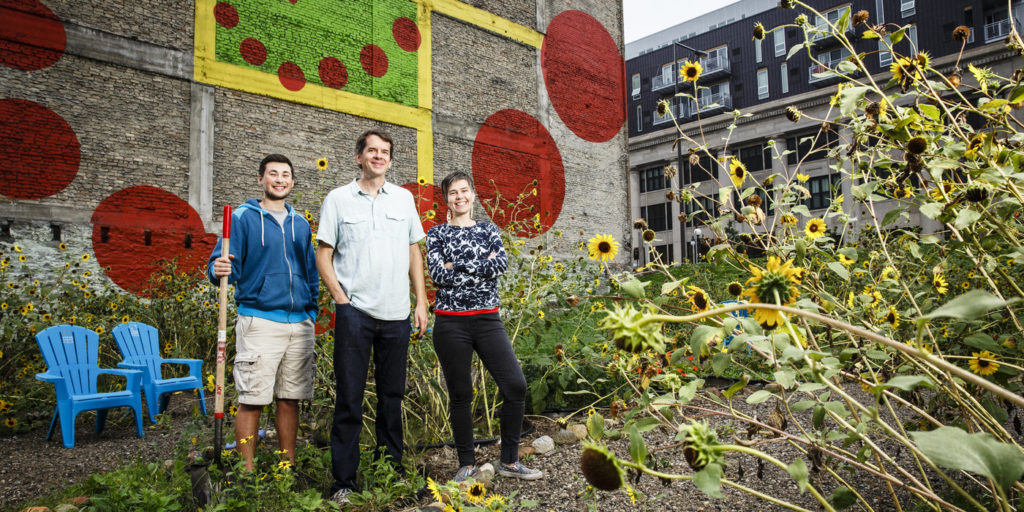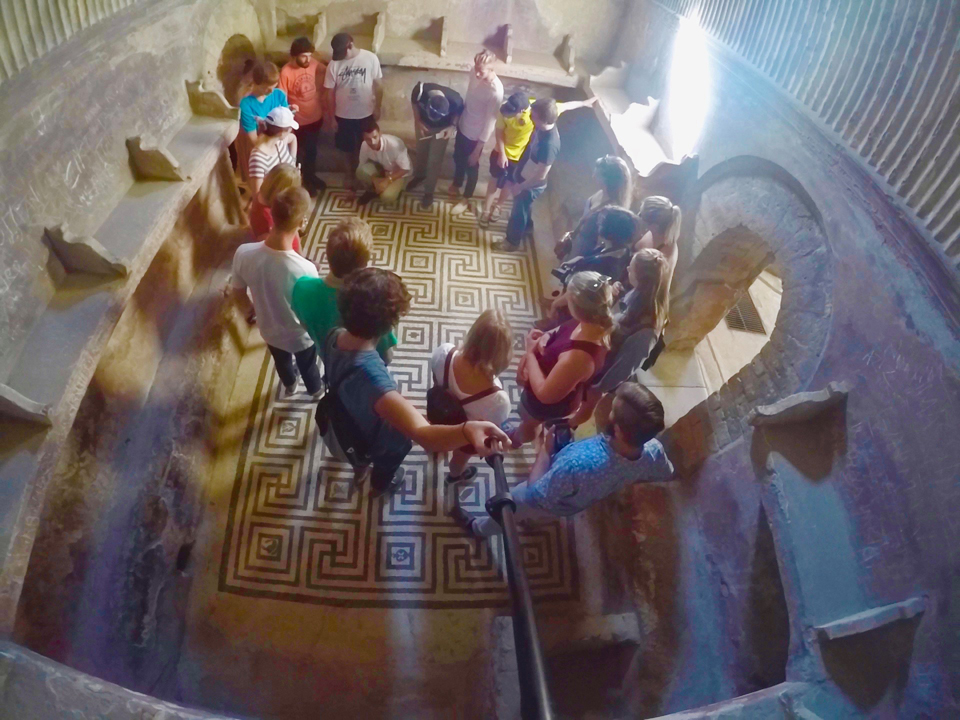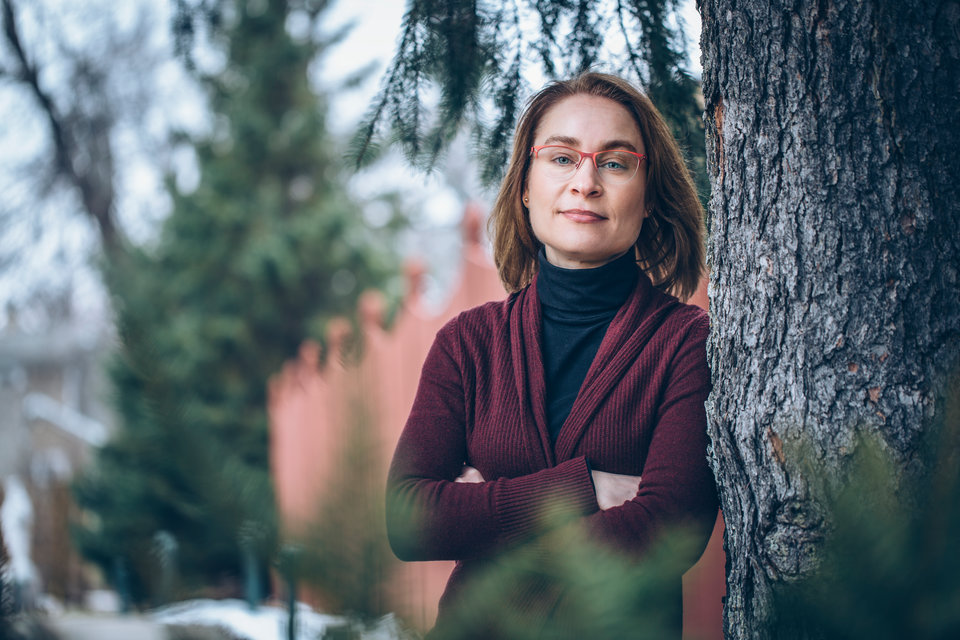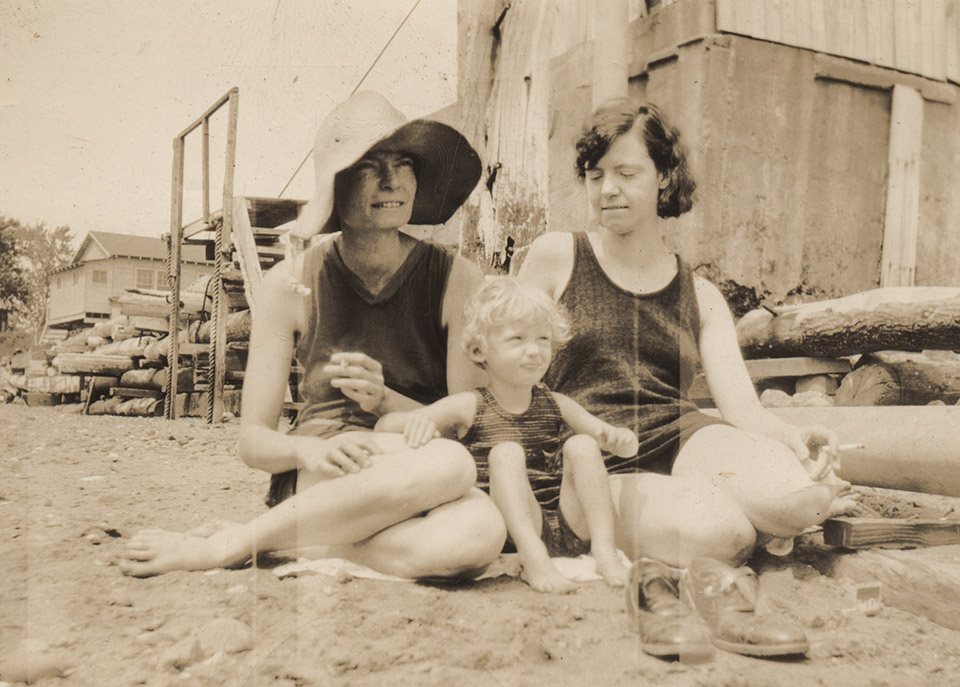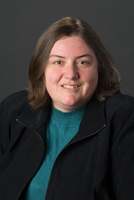
Dr. Lisa Waldner
Now at the helm of the College of Arts and Sciences as one of two new associate deans, Dr. Lisa Waldner is hoping to show colleagues the same respect she showed others through her research. And it’s that respect she also is teaching students in the classroom.
Dr. Lisa Waldner is getting comfortable in her new associate dean’s office in the John R. Roach Center for the Liberal Arts. Extra bookshelves were brought in to accommodate her many sociology books. The office looks like that of an accomplished and astute researcher – which is what Waldner has proven herself to be during her time so far at St. Thomas.
She has written multiple journal articles and book chapters, co-written a book and edited journals. Drawn to topics that she considers “ignored” or as having holes in existing scholarship, Waldner has researched domestic violence and sexual coercion in same-sex relationships, lesbian and gay identity issues, anti-gay hate crimes, AIDS education and even gay skinheads.
Her work culminated in being awarded the John Ireland Presidential Award for Outstanding Achievement as a TeacherScholar last spring, when she was the chair and a professor in the Sociology and Criminal Justice Department. The honor has been bestowed on one or two professors each year since its inception in 2008. It recognizes “outstanding academic achievement of faculty teaching and scholarship, and exemplifies the mission and values of the University of St. Thomas.”
Respecting Radicals
Waldner earned her bachelor’s and master’s degrees from Minnesota State University, Mankato before starting her doctorate at Iowa State University. As a Cyclone, Waldner met Dr. Betty Dobratz, who has become both a mentor and collaborator. Together the two have done research for more than 20 years and currently co-edit The Sociological Quarterly. Dobratz remembers, even from the beginning of their collaborative research, Waldner’s ability to identify under-researched areas and study them further.
“When I first collaborated with her, she was doing work for a volume of the Journal of Political and Military Sociology, and she was looking at the white power movement, where there is very, very little research done,” Dobratz said. “She’s good at formulating a question that needs to be asked in a manner that allows other researchers to be able to acquire the data. She’s very specific. She’s very capable at getting to the heart of the matter.”
Understanding the core beliefs of under-researched groups, such as white power groups, has taken Waldner into unusual research settings. In 2007, Waldner and Dobratz attended a book burning in St. Paul, where Waldner took pictures, asked questions and watched as participants burned several books, including Chicken Soup for the Jewish Soul.
“They have some beliefs that are just abhorrent, and it’s kind of hard sometimes to reconcile this fact with my other experiences with them, which included having some interesting and pleasant conversations and witnessing cordial interactions with black and Hispanic workers at the hotel and restaurant they frequented,” Waldner said.
After, the group attempted to hold a white power concert at the Roseville VFW, but had made the booking as a “reunion.” Once the VFW figured out what was going on, the group was asked to vacate the premises. Police were eventually called in and turned up with German shepherds in tow.
Waldner said the party had to exit single file past the police officers and dogs, and she was “mortified” that the police assumed she was a neo-Nazi. While she wanted to tell the police she was a sociologist and not a member of this group, Waldner knew she had a duty to be respectful. “I was their guest and it would have been inappropriate for me to have said anything,” Waldner said.
In taking on a sensitive or controversial topic, Waldner said it is the researcher’s duty to be clear regarding what his or her goal is in doing research.
“I think the goal (in this case) should be accuracy. We’ve tried to let them speak with their own voice. We did this because you cannot combat something you don’t understand. So if you have an understanding, based mostly on stereotypes like these people are stupid, they’re rednecks, they’re un-evolved, that’s false. It leads to a false sense of security,” she said.
She teaches students that sometimes sociologists are drawn to research topics and even people they may find “repugnant.” Yet, at the end of the day, they have to respect the people they are researching as humans. It’s the researcher’s responsibility to maintain their subjects’ dignity, which ties into the university’s mission to advance the common good.
Writing on walls
Waldner also actively studies the use of graffiti as a political message.
The idea for this research came during the Metro Transit bus strike in 2004, which stranded low-income people who relied on bus service to get to work.
At the time, Waldner and Dobratz were collaborating on a political sociology textbook with a chapter on political participation, and Waldner noticed an abandoned building with a spraypainted message that read, “Bring back the busses Pawlenty.”
“I originally noticed it because ‘buses’ was spelled atypically, and I thought someone was really frustrated and grabbed a spray paint can,” Waldner said. “Something we would normally think of as graffiti, but it was a political message, and I thought, ‘I wonder how many other people do this?’”
Most of the previous sociological work on graffiti has been from a criminological or social-problems perspective, meaning researchers are exploring graffiti as an expression of gang behavior or as an urban problem that needs to be eradicated or at least contained.
The work on graffiti has taken Waldner all over the world. She and Dobratz spent time this summer in Greece interviewing graffiti artists. The year before, she talked to street artists in Japan. Dobratz also conducted some interviews in Germany.
Waldner wants to learn the artists’ ethics and rules, as well as what motivates them to be politically active. She wants to give their method of expression legitimacy. Again, Waldner said respect is key.
“The people we met who do graffiti are not conformists; they’re rule breakers, and they look like it, and as a result these are not people that others would necessarily feel comfortable with meeting them on the street, but they are very interesting and definitely they’re not unsafe to talk to,” Waldner said.
More importantly, their messages matter and people see them, so Waldner is listening to the artists directly.
A book on graffiti and political participation is a work in progress. While Waldner said she definitely has publishers who are interested, she would like to collect more data from street artists in the United States.
While she is attracted to more “controversial topics,” Waldner said St. Thomas is supportive of her work.
“I’ve always felt totally respected in that regard, and for that I’m really grateful. It’s good to have administrators who recognize the value of what I do and that there’s a variety of ways that people can practice their disciplines, and that can all support the mission,” Waldner said.
As an administrator, she hopes to continue supporting her colleagues and upholding the university’s strong Catholic intellectual tradition.
“I think how I’ve been treated is a great model for how I ought to be supporting faculty in the College of Arts and Sciences,” Waldner said. “I would simply hope to treat them the same way that I was treated, which was with respect and support.”
Paying it forward
Waldner said one of the most significant lessons she has learned from Dobratz is the importance of giving back to her students.
“She has created a lot of opportunities for me that I’ve definitely professionally benefited from, so I have tried to do the same things for my students,” Waldner said.
She has involved students in her research, including publishing and presenting conference papers with them. St. Thomas honored Waldner in 2006 with the Undergraduate Research and Collaborative Scholarship Award, a nod to her work with students.
Waldner also has helped her students transition into graduate and doctoral studies.
Kylee Joosten ’13, a sociology major, recently finished her master’s degree in sociology at the University of Illinois at Chicago, where her thesis was on veteran health in relation to gender, using data from the Minnesota Population Center.
Joosten did two research projects as an undergraduate with Waldner, which were funded by a Luann Dummer Center for Women student research fellowship and a Young Scholars research grant. The research was on sexual coercion among women in intimate relationships, as well as men as victims of sexual coercion with women as aggressors.
Sexual coercion is different than rape, Waldner explained. “Sexual coercion is a broader category and is really defined as unwanted pressure to engage in any type of sexual behavior. It can range from unwanted kissing to sexual intercourse, and the strategies perpetrators can use can range from things that are not illegal, such as verbal coercion and the use of guilt, all the way to physical violence and physical force that we would define as rape,” she said. “So the key here is that at the most extreme form we are talking about behavior that is illegal, but at the milder end, we’re talking about behavior that is unethical in my opinion.”
Joosten said the opportunity to work closely with Waldner helped her
“I can honestly say I don’t think I would be where I am without her,” Joosten said. “Without her mentoring and helping me research, I don’t think I would have gotten into graduate school, and I wouldn’t be where I am at the moment.”
Since completing her program, Joosten has returned home to Coon Rapids and is job-hunting. She plans to get her Ph.D. in a few years.
Another former student, Dr. Valerie Clark ’03, is now working as a researcher in the Minnesota Department of Corrections. She also credits her undergraduate work with Waldner as a launching pad to professional success.
Their research project was on AIDS knowledge in relation to education and attitudes. Clark said this background helped her when she went on to her post-doctorate studies at Pennsylvania State University.
Waldner asked Clark to come back and teach undergraduate courses in the Sociology and Criminal Justice Department last year.
“I love teaching, so that’s why I’m really grateful to her for thinking about me to teach,” Clark said.
The fact that Waldner thinks of her students when these opportunities arise, Clark added, is a testament to her desire to give back to students.
Dobratz said it has been wonderful to see Waldner grow as a professional and take on the role as an associate dean.
“I think she’s done really, really well,” Dobratz said. “She works really hard both at her research at St. Thomas, and she’s also a very qualified teacher. She’s done really great at both of those things. Now she’s moving onto administration, and I think she’ll be strong in this as well.”
Read more from CAS Spotlight.

